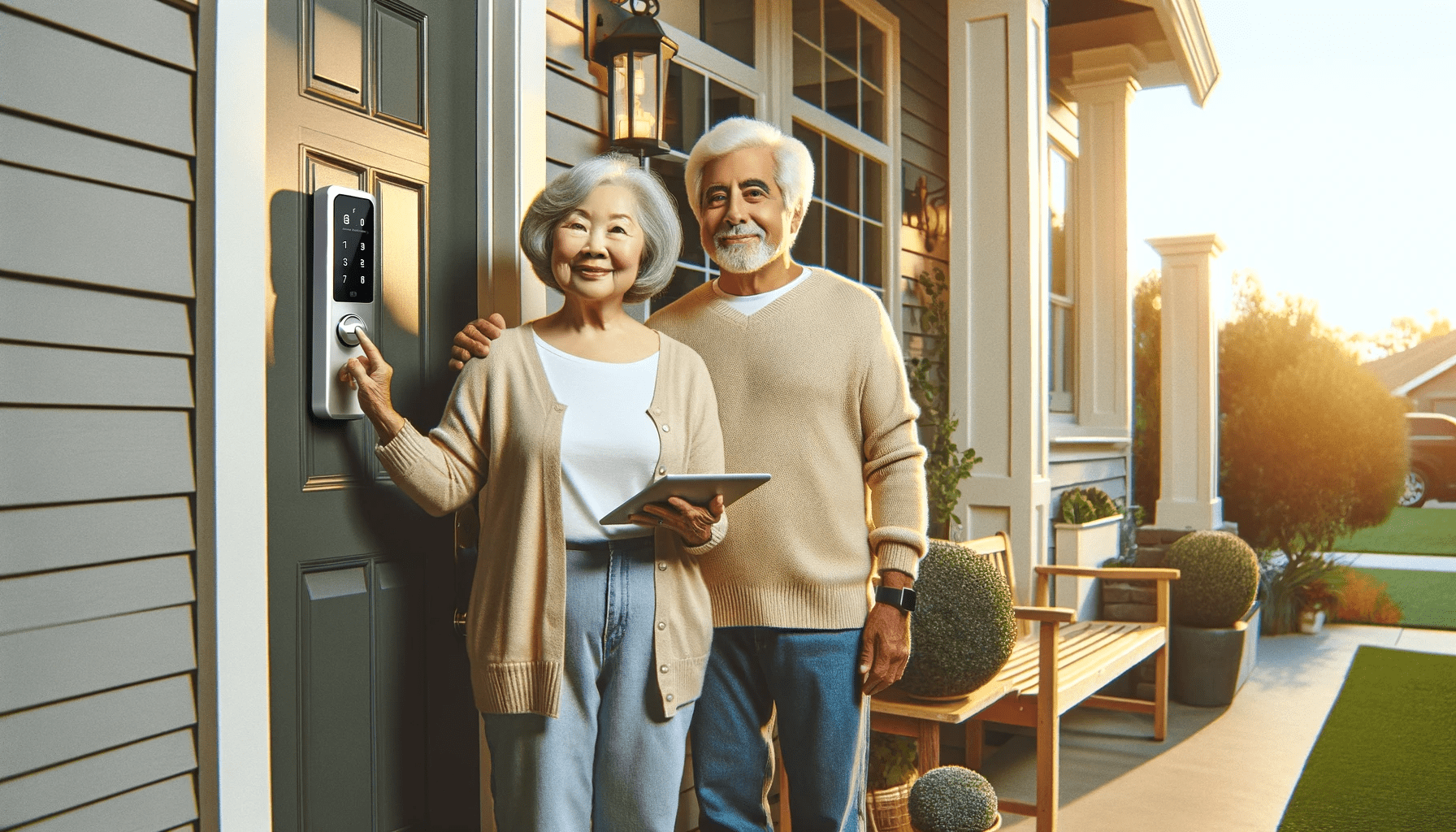Smart Locks for Seniors Top Informational Guide 2024
Smart Locks for Seniors
The dawn of the digital age has revolutionized how we secure our homes. Traditional locks and keys have given way to an era of smart technology, where the security of a home can be managed with the touch of a button or the sound of a voice. Among the array of smart home devices, smart locks are emerging as a pivotal tool to enhance home security while offering unmatched convenience and accessibility.
For seniors, smart locks represent more than just a technological advancement; they are a means to a safer, more independent life. The aging population can benefit significantly from smart locks, as these devices eliminate the common challenges associated with traditional locks, such as the fumbling for keys or the risk of being locked out due to forgotten keys.
Smart locks for seniors embody the perfect blend of security, convenience, and accessibility. They provide the elderly with the peace of mind that comes from knowing their homes are secure and that they can grant or deny access from anywhere, at any time. With features like remote locking and unlocking, easy-to-use interfaces, and voice-activated controls, smart locks are designed to accommodate the varying needs of senior citizens.
The significance of smart locks in the lives of seniors cannot be overstated. They empower seniors to maintain their independence, manage their home security with ease, and enjoy the benefits of modern technology without complexity. As we delve into the world of smart locks, we understand that these devices are not just about embracing new technology—they’re about enhancing the quality of life for seniors, making safety and security a readily achievable priority.
This is an information Guide, but if you are looking for the best smart locks for seniors look no further: Best Smart Locks for Seniors in 2024 – Top 5
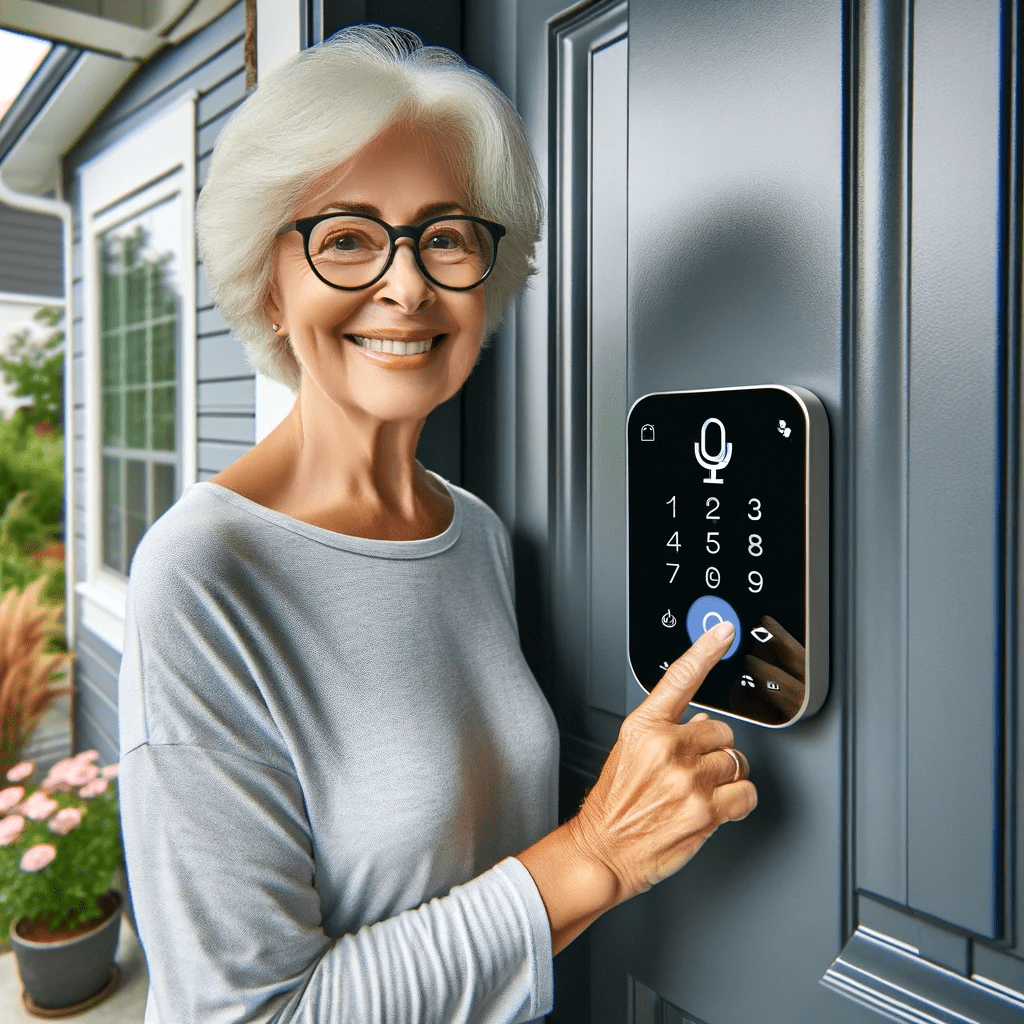
What are Smart Locks for Seniors?
Smart locks are advanced locking systems that provide an array of features far beyond the traditional lock-and-key mechanism. They incorporate technology that allows doors to be locked and unlocked using a variety of methods, including smartphones, biometric scanning, keypads, or remote control. At their core, smart locks operate through a combination of wireless technologies such as Wi-Fi or Bluetooth and sometimes use cryptographic keys for enhanced security.
The working principle behind smart locks is relatively straightforward. They usually connect to a home network, allowing users to operate them via a mobile app or a smart home hub. When an authorized device sends a signal to the lock, it verifies the command and actuates the locking mechanism accordingly. This process can include entering a code, using a smartphone app, or utilizing a voice command.
The evolution of locks has been a journey from mechanical to digital sophistication. Traditional locks started as simple mechanical devices — metal keys inserted into locks to move pins and tumblers into the correct position to open. Over time, locks became more complex and secure, with innovations such as deadbolts and combination locks.
However, as technology advanced, so did the methods of bypassing these traditional security measures. This led to the development of electronic locks, which introduced keycards and pin codes as alternative methods to access secured doors. The introduction of electronic locks was a significant step towards the smart locks we see today.
Smart locks emerged as a natural progression in the evolution of lock security, with the growing adoption of home automation systems and the Internet of Things (IoT). They were designed to mesh with the lifestyle of a connected world, where convenience and efficiency are paramount. The integration of smart locks into home automation systems has led to a new wave of home security measures, where user access can be managed with unprecedented flexibility and control.
This move towards smarter locking mechanisms reflects a broader trend in home security, where personalization, remote access, and integration with other smart devices are key components of the modern, connected home. Smart locks don’t just secure doors; they connect to a home’s ecosystem, allowing for a seamless, automated, and more secure living experience.
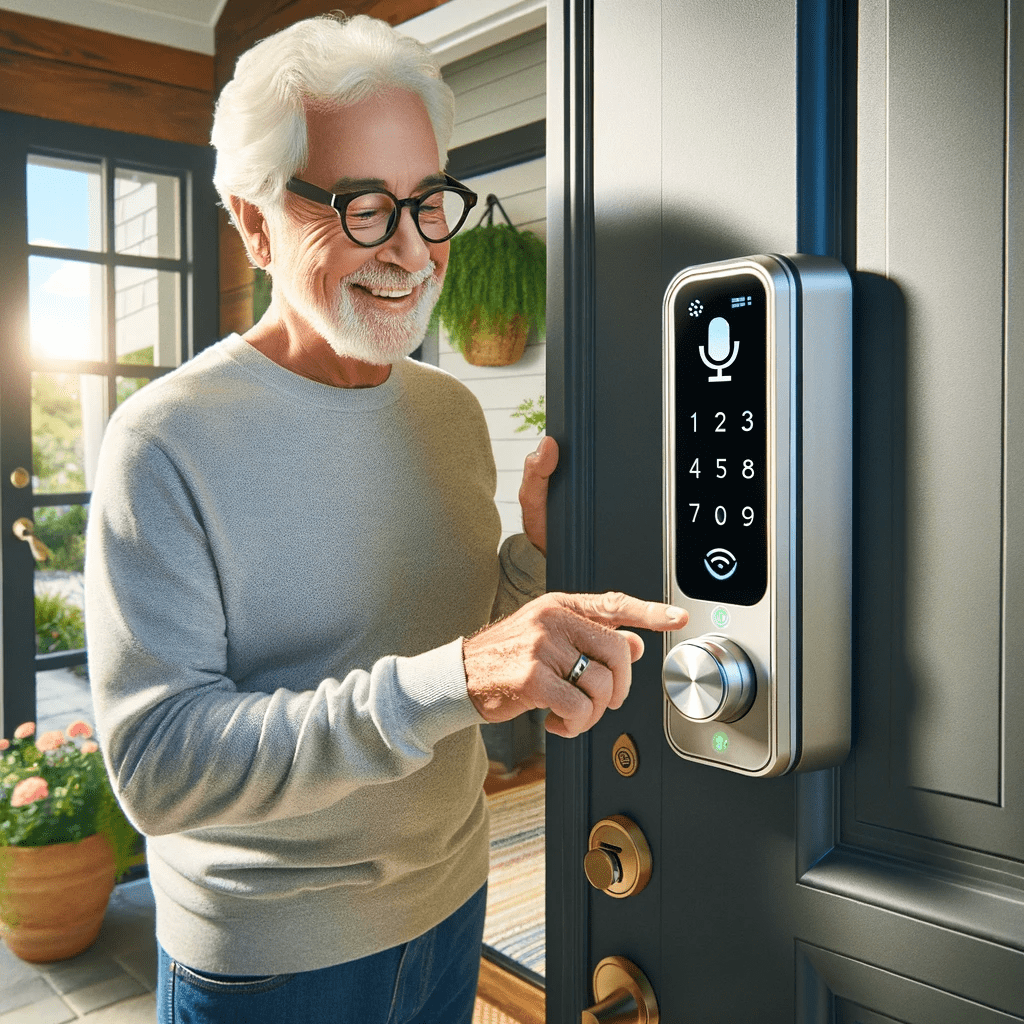
The Importance of Smart Locks for Seniors
Smart locks hold particular importance for seniors, offering them a range of benefits tailored to meet their needs and challenges. One of the foremost advantages is the removal of the need to carry physical keys, which can be a boon for those with mobility issues or conditions like arthritis that make small, precise movements difficult. The risk of losing keys or the struggle to fit them into locks is eliminated, simplifying the process of securing their home.
Remote access is another pivotal feature that smart locks offer to seniors. It allows for doors to be locked or unlocked from any location, providing an added layer of convenience and safety. For instance, if a senior forgets to lock the door, it can be done remotely without the need to return home. Additionally, caregivers or family members can be granted temporary access to the home without the need to make and distribute spare keys, which also poses a security risk.
The relationship between smart locks and independent living for seniors is robust and multifaceted. Smart locks empower seniors to manage their home security without reliance on others, which can contribute significantly to their sense of independence and autonomy. This is particularly important as many seniors prefer to age in place, living in their own homes rather than moving to assisted living facilities.
Moreover, smart locks can provide a safer living environment. Features like automatic locking can ensure that a door is never inadvertently left unlocked, and some smart locks can send alerts to the user if the door is ajar or if there has been an attempt to tamper with the lock. For seniors who may be prone to forgetfulness, these features maintain a secure environment without them having to perform checks manually.
Furthermore, the integration of smart locks with other smart home devices can be particularly beneficial for seniors. For example, a smart lock can work in tandem with a video doorbell to allow the senior to see who is at the door before unlocking it, which adds a layer of security against potential scams or break-ins.
In essence, smart locks for seniors translate into a combination of strengthened home security, enhanced convenience, and supportive independence. These locks are not just devices; they are tools that support a lifestyle, providing peace of mind to both the seniors who use them and their loved ones.
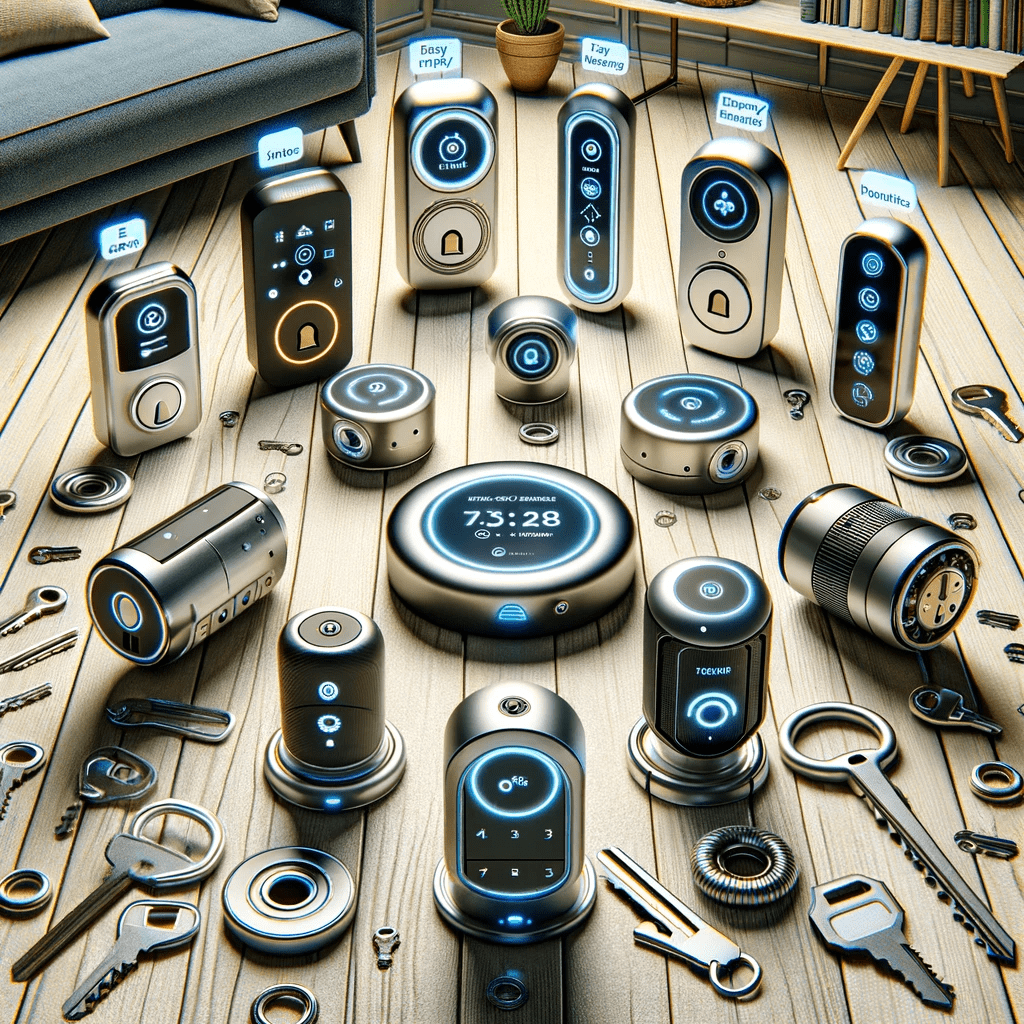
Features to Consider in Smart Locks for Seniors
When considering smart locks for seniors, certain features stand out for their ability to provide convenience, safety, and adaptability. The following are some key aspects to keep in mind:
Keyless Entry Options
Keyless entry is fundamental for seniors who may find it challenging to use traditional keys. Options like numeric keypads or touch-to-open technology can simplify the unlocking process. Keyless systems also offer customizable entry codes, which can be shared with family members or caregivers without the risk of keys being lost or copied.
Remote Access and Monitoring Features
Remote access is a feature that enables seniors to lock and unlock their doors from anywhere using a smartphone or web interface. This is not only convenient but also allows for real-time monitoring of who enters and exits the home. Alerts can be set up to notify when the door is used, providing an audit trail of daily visitors and ensuring that the home remains secure.
Compatibility with Other Smart Devices
Smart locks that are compatible with other devices can create a cohesive and interconnected smart home environment. This compatibility allows for routines and scenarios where actions are automated based on certain triggers, like locking doors when a connected security system is armed or turning on lights when a door is unlocked, which can be particularly useful for seniors living alone.
Emergency Access Features
Smart locks can include emergency features that allow quick access to first responders. By using a one-time access code or enabling remote unlocking, emergency personnel can enter the home without forced entry, which is essential during critical situations.
Simple User Interface and Ease of Installation
A straightforward user interface is crucial for seniors who may not be as familiar with digital technology. Large, clear buttons and an intuitive app design can make it easier for them to operate the lock without frustration or error. Additionally, the installation process should be simple or accompanied by professional installation services to ensure that the lock is set up without any issues.
Incorporating these features into a smart lock system for seniors can greatly enhance their user experience and provide them with a sense of confidence in their home security system. It’s important to strike a balance between advanced functionality and simplicity to ensure that the technology truly serves the needs of the elderly. This is an information Guide, but if you are looking for the best smart locks for seniors look no further: Best Smart Locks for Seniors in 2024 – Top 5
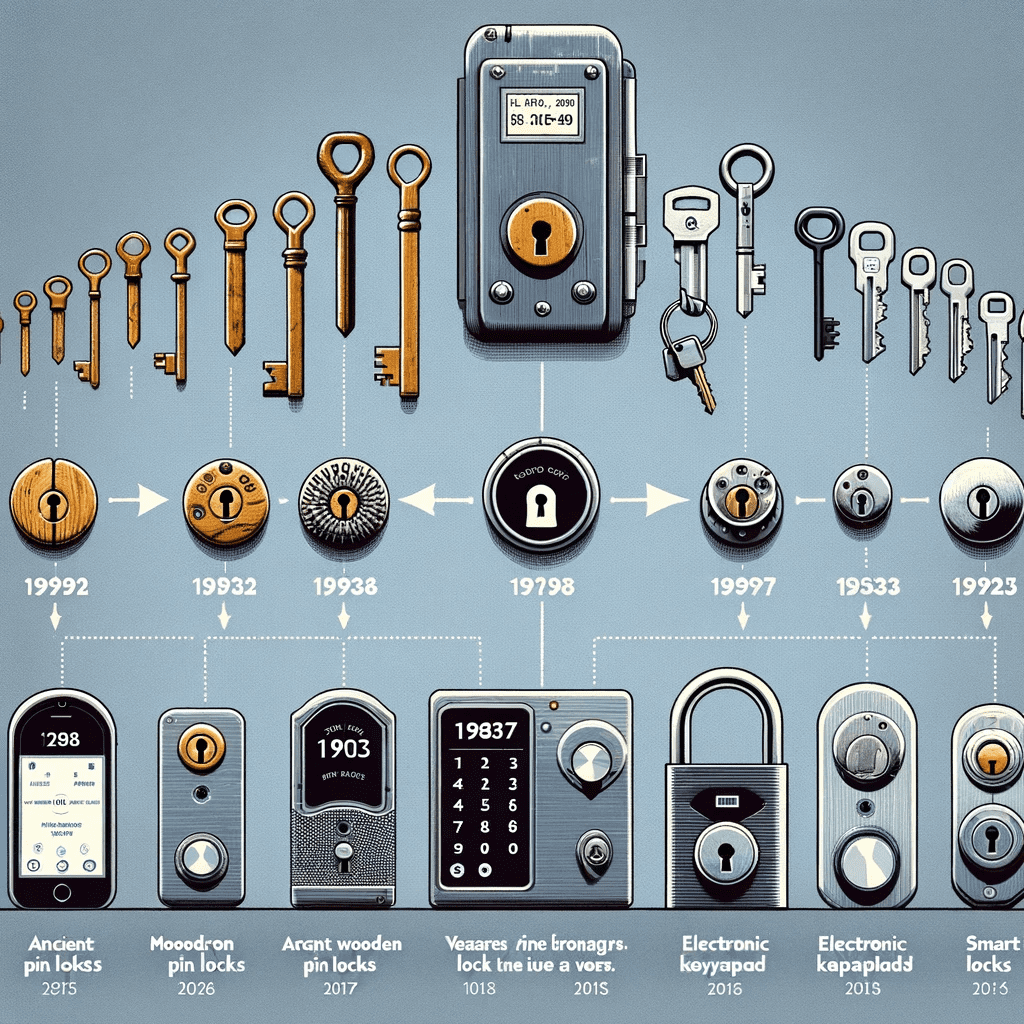
Safety and Security: The Core of Smart Locks
Safety and security are paramount when it comes to choosing a smart lock, especially for seniors who may be more vulnerable to break-ins and scams.
Enhancing Security Over Traditional Locks
Smart locks enhance security by offering features that go beyond what traditional mechanical locks can provide. They allow for customizing user access, which means that seniors can assign specific entry codes to family members or caregivers and easily change or delete them if necessary, without the need to physically change the lock. Moreover, the ability to lock and unlock doors remotely reduces the chance of doors being left unlocked.
Encryption and Security Features
To protect against the potential risks of hacking, smart locks use advanced encryption methods—the same technology used in online banking and secure data transmission. This encryption makes it extremely difficult for unauthorized users to intercept the digital communication between the lock and the user’s device. Additionally, many smart locks come with built-in alarm systems that alert homeowners of potential tampering or forced entry attempts, providing an added layer of security.
Accessibility and Ease of Use
Accessibility is crucial in the design of smart locks, ensuring that they are suitable for seniors with varying needs and abilities.
User-Friendly Design Elements
The design elements of smart locks consider the potential limitations that seniors may face. Large, tactile buttons, simplified keypads, and voice-guided programming can make smart locks much more accessible. Some smart locks also feature oversized touch screens with clear instructions and feedback that confirm successful locking or unlocking, which is particularly helpful for those with visual or cognitive impairments.
Voice Activation Features
Voice activation through virtual assistants like Amazon Alexa or Google Assistant offers a hands-free operation, which can be incredibly beneficial for seniors. By using simple voice commands, users can manage their door locks without having to physically interact with them, thus accommodating various mobility or dexterity issues.
Touchpad and Screen Readability
For seniors with visual impairments, smart locks with well-lit keypads and screens with large fonts can be a significant aid. The backlighting on keypads ensures that the numbers are visible in low-light conditions, while high-contrast screens can aid in readability. Some models also provide audible feedback when a button is pressed, confirming the action for those who cannot see the screen clearly.
By prioritizing these accessibility and ease-of-use features, smart locks can provide seniors with a secure and manageable way to maintain their home security without reliance on others. These considerations are key to ensuring that the technology serves to enhance their independence and peace of mind.
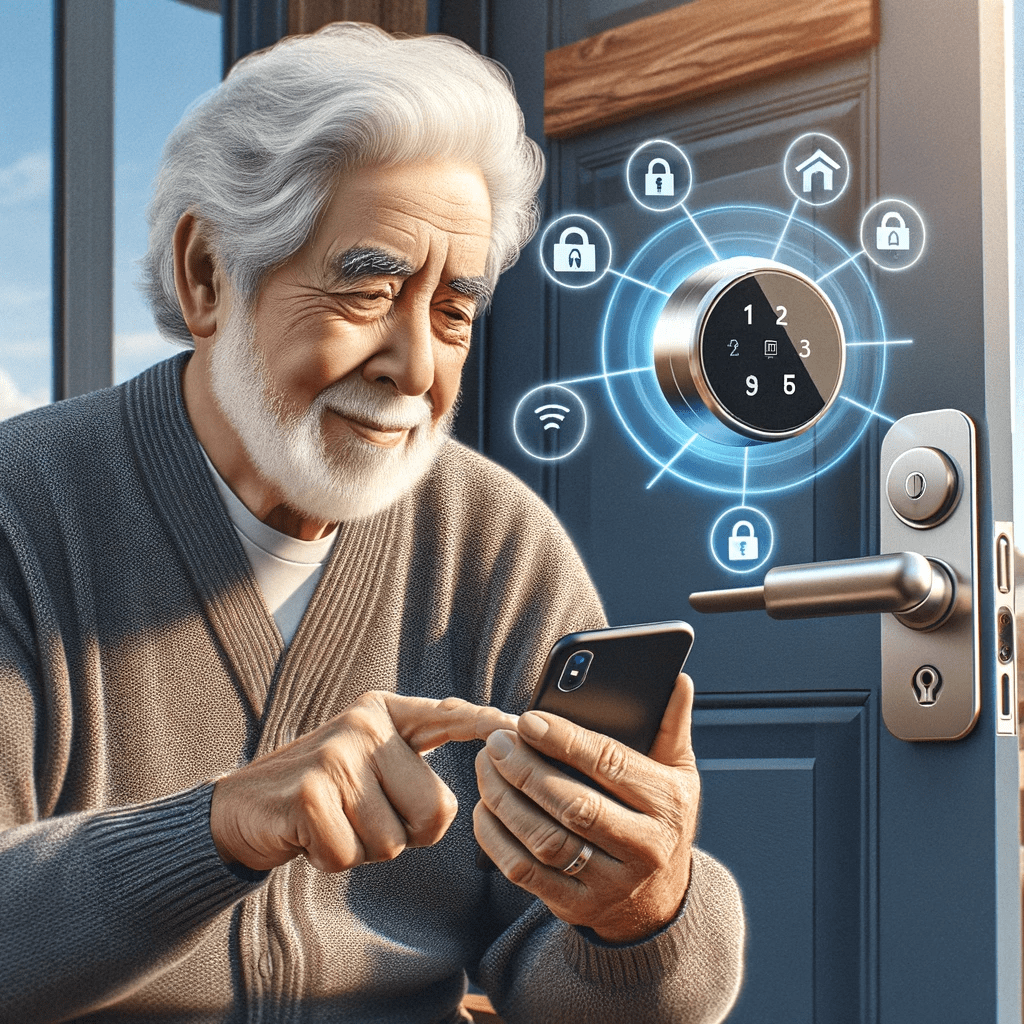
Integration with Smart Home Systems
The integration of smart locks with existing smart home systems presents several advantages that can enhance the living experience for seniors.
Advantages of Integration
Smart home systems offer a centralized platform for managing various devices, and integrating smart locks into this system allows for seamless control and automation of home security. For example, a smart lock can be programmed to automatically engage at a certain time in the evening, ensuring the home is secure at night.
Simplifying Routine Tasks
Routine tasks like checking if all doors are locked before bedtime or controlling which doors are accessible at different times of the day can be managed through simple voice commands or from a smartphone app. This integration simplifies daily routines, making it easier for seniors to manage their home security without physically moving around or performing repetitive checks.
Improving Emergency Responses
In emergencies, time is of the essence. Integrated smart home systems can be set up to unlock doors automatically in the event of a fire or carbon monoxide alarm, facilitating a faster and safer exit from the home. Moreover, in the case of medical emergencies, smart locks can grant access to emergency personnel without delay, potentially saving lives by reducing entry time.
Smart Lock Maintenance and Support
Maintaining a smart lock is relatively straightforward, but there are still considerations that seniors should be aware of to ensure their smart lock systems remain reliable and functional.
Maintenance Needs of Smart Locks
Maintenance for smart locks typically involves ensuring that the device’s firmware is regularly updated, which can often be done automatically or with the click of a button in the app. Battery replacement is another common maintenance task, and most smart locks have indicators for low battery status. Physical maintenance may include cleaning the touchpad and making sure the lock mechanism is not obstructed by debris.
Customer Support and Technical Help
Many smart lock companies offer robust customer support tailored to assist users who may not be tech-savvy. This can include extensive online resources, like FAQs and video tutorials, as well as customer service hotlines. Technical support may also include assistance with installation, troubleshooting, and guidance on integrating the lock with other smart home devices. For seniors, the availability of responsive and helpful customer service can make all the difference in maintaining the functionality and benefits of their smart locks.
Making the Right Choice: A Buyer’s Guide
Choosing the right smart lock requires careful consideration of personal needs and circumstances. Seniors or their caregivers should consider the following factors to make an informed decision:
- Ease of Use: Select a lock with a user-friendly interface, clear instructions, and easy operation.
- Physical Needs: Consider any physical limitations, such as dexterity or vision impairments, that may influence the type of smart lock needed.
- Security Features: Evaluate the security features offered, including encryption and auto-locking capabilities.
- Smart Home Compatibility: Ensure the smart lock is compatible with existing smart home devices for streamlined automation.
- Emergency Access: Look for locks that provide quick access options for emergencies.
- Installation and Support: Choose a lock that offers straightforward installation, with professional installation services available if needed, along with responsive customer support.
Conclusion to Smart Locks for Seniors
Smart locks represent a significant step forward in combining convenience, security, and accessibility for seniors. By understanding what smart locks are and how they work, recognizing their importance for independent living, and considering the right features, seniors can significantly benefit from this technology. The integration of these locks into wider smart home systems enhances their utility, making everyday tasks simpler and safer. Maintenance and support are also critical components, ensuring that these systems continue to serve the needs of seniors effectively.
As we look forward to the future, it’s clear that the role of smart locks in senior care is set to expand, with innovations that promise even greater security and integration with health and wellness monitoring. Making the right choice in a smart lock is about understanding current needs and anticipating future trends, ensuring that seniors have the tools they need to live independently and securely in their own homes. With the right approach and information, smart locks can be a valuable investment in any senior’s safety and quality of life.
This is an information Guide, but if you are looking for the best smart locks for seniors look no further: Best Smart Locks for Seniors in 2024 – Top 5
What is the best lock for old people?
The best lock for older adults is one that combines simplicity and security. Look for locks with keyless entry, clear touchpads, remote access, and emergency unlocking features. These locks should also be compatible with other smart home devices and have a straightforward user interface.
What is the smart lock for the elderly?
A smart lock suitable for the elderly is designed with features that cater to their specific needs, like ease of use, low physical effort to operate, and enhanced security measures. It should provide remote control, the ability to grant access to caregivers, and simple, intuitive operation.
What is the best smart lock for dementia patients?
For dementia patients, the best smart lock is one that offers additional safety features, such as automatic locking, direction prompts, and alerts to family members or caregivers when the door is unlocked. It should prevent unauthorized exit while allowing easy entry for authorized individuals.
What are the disadvantages of smart locks?
The disadvantages of smart locks include their reliance on electricity and connectivity, potential vulnerability to sophisticated hacking, and the possibility of system failure due to technical glitches or dead batteries. Seniors might also find the technology intimidating if they are not tech-savvy, which could lead to user errors.
Other Resources: Smart lock buying guide: Find the right lock for your front door,
Smart locks for aging in place., Smart Locks and Seniors: How You and the Elderly Can Benefit From This Technology, Smart Locks

